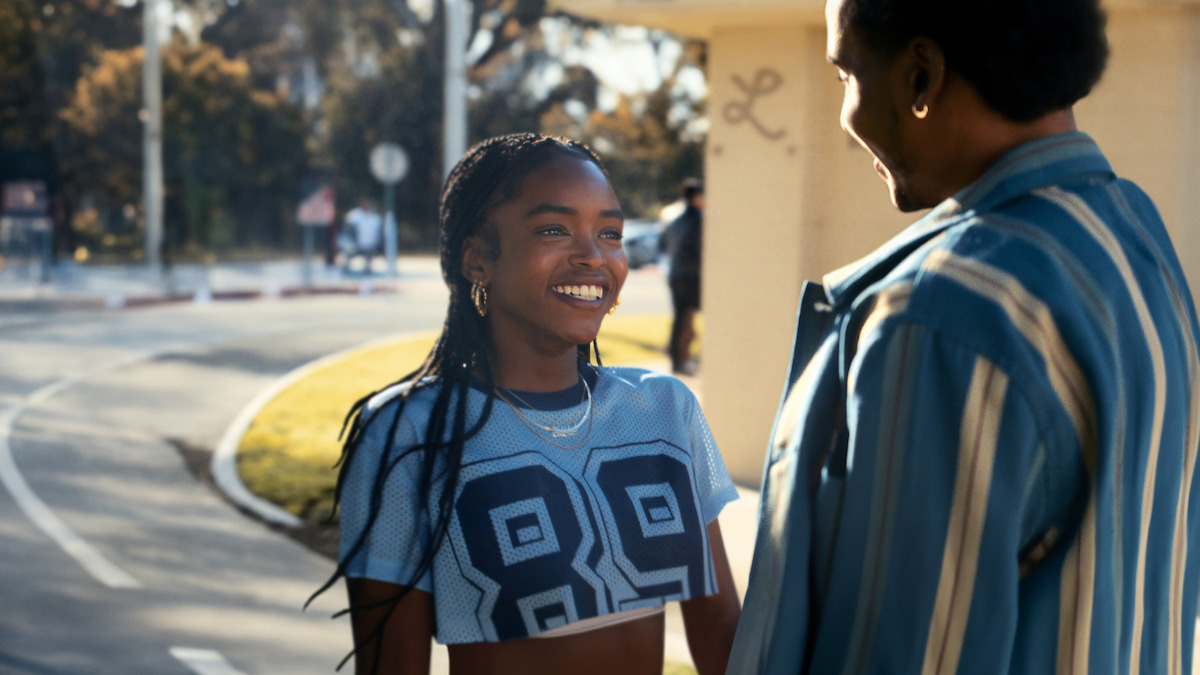Get ready for a nostalgic yet fresh experience as Judy Blume’s influential 1975 novel “Forever” comes to Netflix in 2025. The streaming giant is reimagining this coming-of-age classic for today’s audience, focusing on two Black teenagers navigating their first romantic relationship in 2018 Los Angeles. This modern adaptation maintains the spirit of Blume’s groundbreaking exploration of teenage sexuality while updating the setting and characters to reflect contemporary experiences.
The original novel broke barriers with its frank discussion of first love and sexual awakening, topics that were rarely addressed in young adult literature at the time. Now, producer Mara Brock Akil brings a fresh perspective to this timeless story, centering Black teens as they discover romance and explore their identities. The series promises to honor Blume’s legacy of honest portrayal of young relationships while adding new dimensions through its diverse casting and modern setting.
Netflix’s adaptation arrives at a time when authentic representation in coming-of-age stories continues to expand in media. The teaser released by Netflix hints at a thoughtful, heartfelt approach that will resonate with viewers who grew up with the book and introduce a new generation to its powerful themes of love, identity, and self-discovery.

A Modern Reimagining of a Groundbreaking Classic
Judy Blume’s Forever, originally published in 1975, has long been both celebrated and challenged for its honest portrayal of teenage love and sexuality. Now, fifty years later, it’s being reintroduced to a new generation—this time through the lens of a Netflix original series. Set to premiere on May 8, 2025, the adaptation is not just a faithful retelling, but a complete reimagining that places the story in 2018 Los Angeles with a fresh cast of characters, modern themes, and a vibrant cultural backdrop.
This isn’t just a nostalgia play for longtime Blume readers. The Netflix version of Forever aims to speak directly to Gen Z, tackling contemporary issues around identity, consent, ambition, and what it means to fall in love for the first time in today’s world.
Meet Keisha and Justin — The New Faces of First Love
At the heart of Forever are Keisha Clark and Justin Edwards, portrayed by Lovie Simone and newcomer Michael Cooper Jr., respectively. Keisha is a confident, focused high school track star with dreams of attending Howard University. Justin is a rising basketball player hoping for a Division I scholarship. When the two reconnect after years apart, a tender romance begins to unfold—one that challenges both of them to confront their boundaries, desires, and personal goals.
Their chemistry anchors the story, and from the early teasers, it’s clear that the show leans into realism. There’s a raw, unpolished honesty in how Keisha and Justin talk, flirt, argue, and fall for each other—exactly the kind of emotional depth Blume was known for in her writing.
Shifting the Setting to 2018 L.A.
Moving the story from its original 1970s setting to 2018 wasn’t just a stylistic choice. It adds a whole new layer of relevance and complexity. In this new version, characters navigate a world shaped by social media, changing conversations around gender and sexuality, and the pressures of college admissions in a hypercompetitive environment. But the core themes—young love, personal growth, and learning to make your own choices—remain timeless.
Los Angeles is more than a backdrop here. It’s a character of its own. From sunlit track fields and buzzing school hallways to warm family dinners and late-night car rides, the city adds texture to every scene. And the cultural specificity of a Black coming-of-age story set in L.A. brings new life to Forever‘s universal themes.
Behind the Scenes: A Powerhouse Creative Team
The show is helmed by Mara Brock Akil, best known for her work on Girlfriends and Being Mary Jane. Her presence alone guarantees an emotionally intelligent and culturally rich take on the material. She’s spoken openly about how Forever influenced her own creative voice, and this adaptation feels personal in all the right ways.
Regina King is also on board as a producer and directs the pilot episode, setting the tone for the rest of the series. With her eye for nuance and character-driven storytelling, King brings a grounded elegance that matches the emotional stakes of the story. Other cast members include Karen Pittman and Wood Harris as Justin’s supportive but protective parents, and Xosha Roquemore as Keisha’s fiercely loving mother.
Why This Matters Now
There’s something quietly revolutionary about Forever coming to Netflix in 2025. In a landscape where teen dramas often lean into melodrama or fantasy, this one opts for something more intimate, more real. It trusts young viewers to handle nuanced conversations about sex, love, and growing up. It also puts young Black love at the center of the story, not as a subplot or side note, but as the whole point.
In many ways, Forever is still doing what Judy Blume always did best—telling the truth, even when it’s messy. Only now, it’s doing it through voices and visuals that reflect today’s world more accurately than ever before.
As the May release date approaches, this adaptation stands poised to be one of Netflix’s most impactful teen series yet—not just a tribute to Blume’s legacy, but a bold new chapter in its own right.
Key Takeaways
- Netflix’s 2025 adaptation of “Forever” reimagines Judy Blume’s classic novel with Black teen protagonists in 2018 Los Angeles.
- The series maintains the original’s honest exploration of first love while adding contemporary perspectives on identity and romance.
- Produced by Mara Brock Akil, this adaptation aims to connect with both longtime fans and new audiences through authentic representation.
Origins of ‘Forever’
Judy Blume’s novel “Forever” marked a significant turning point in young adult literature when it was published in 1975, addressing teenage sexuality with unprecedented frankness. The book challenged taboos and created space for honest conversations about relationships and intimacy.
Judy Blume’s Groundbreaking Novel
“Forever” emerged from Judy Blume’s desire to write a story about teenagers who have a positive sexual experience with no dire consequences. Blume wrote the novel for her teenage daughter, who had asked for a book about two teenagers who have sex “without having to die at the end.” At the time of its publication, most young adult novels portrayed sexual activity as something that led to tragedy.
The book follows Katherine and Michael, two teenagers who fall in love and navigate their developing relationship. Blume approached the subject with candor and sensitivity, addressing topics like birth control and consent that were rarely discussed in young adult literature.
Despite its popularity with young readers, “Forever” faced significant censorship challenges. It appeared on banned book lists across America due to its frank sexual content.
The Cultural Impact of the 1975 Novel
“Forever” revolutionized young adult literature by treating teenage sexuality as a natural part of growing up rather than something shameful or dangerous. The novel sold millions of copies and became a cultural touchstone for generations of readers.
The book’s impact extended beyond sales numbers. “Forever” opened doors for more honest portrayals of adolescence in literature and media. Many readers credit the novel with helping them navigate their own relationships and understand the emotional and physical aspects of intimacy.
Blume’s work challenged the notion that young adult literature should shield teens from difficult topics. Instead, she provided a roadmap for discussing complex issues with honesty and respect for young readers’ intelligence.
The enduring relevance of “Forever” speaks to how accurately Blume captured the universal experiences of first love and self-discovery, themes that resonate across generations.
About the Netflix Adaptation
Netflix’s adaptation of Judy Blume’s “Forever” transforms the classic 1975 novel into a contemporary drama for today’s audience. The series focuses on two Black teens navigating their first love experience while discovering their identities in modern-day Los Angeles.
Conception and Development
Netflix announced the adaptation of “Forever” two years ago, recognizing the timeless appeal of Judy Blume’s groundbreaking work. The streaming platform chose to reimagine the novel rather than create a direct adaptation, updating the story for today’s viewers while preserving its emotional core.
The adaptation maintains the novel’s exploration of teenage first love but introduces new characters and settings. This fresh approach allows the story to resonate with contemporary audiences while honoring Blume’s original themes.
The project represents Netflix’s commitment to diverse storytelling. By centering the narrative on Black teens, the adaptation brings new perspectives to Blume’s exploration of young love, identity, and self-discovery.
Mara Brock Akil as Showrunner
Mara Brock Akil serves as the creative force behind this adaptation. As a megaproducer with extensive experience in television, Brock Akil brings her distinctive vision to this beloved story.
Her previous work includes creating shows that authentically portray Black experiences and relationships. This background makes her uniquely qualified to lead “Forever” into a new era.
Brock Akil’s approach focuses on preserving the emotional authenticity of teenage love while exploring the cultural specificities of the characters’ experiences. Her storytelling typically balances humor with thoughtful examinations of relationships.
Netflix has expressed confidence in Brock Akil’s ability to translate Blume’s work for a new generation. Her leadership promises to bring fresh energy to this classic coming-of-age narrative.
Setting the Scene: Los Angeles, 2018
The adaptation transports Blume’s story to Los Angeles in 2018, creating a contemporary backdrop for the teenage romance. This setting offers a vibrant, diverse environment that shapes the characters’ experiences.
Los Angeles provides both glamorous and ordinary settings for the teens’ romance to unfold. The 2018 timeframe allows the story to incorporate modern technology, social media, and cultural references while still feeling relevant to today’s viewers.
The urban setting introduces new dimensions to the original story. Characters navigate their relationship within a complex social landscape that includes family expectations, peer pressure, and cultural influences specific to LA.
This modernized setting helps address contemporary issues facing teenagers. The adaptation examines how young people explore romance and identity in a digitally connected world where relationships develop both online and in person.
Casting the Vision
The adaptation of Judy Blume’s “Forever” brings together a talented ensemble to portray this reimagined story of first love between two Black teenagers in 2018 Los Angeles. The casting choices reflect the show’s commitment to authentically representing young romance while honoring the groundbreaking nature of Blume’s original work.
Main Characters and Cast
Lovie Simone leads the cast in this modern retelling of Blume’s classic story. She brings depth and nuance to her character, portraying the complexities of first love with remarkable authenticity. Michael Cooper Jr. stars opposite Simone, creating a chemistry that captures the awkward yet beautiful journey of teenage romance.
The two young actors tackle the challenging material with maturity and sensitivity. Their performances address the novel’s frank approach to sexuality while adding contemporary perspectives on identity and self-discovery.
Karen Pittman and Wood Harris portray parental figures in the series, offering guidance and sometimes resistance as the teens navigate their relationship. Their characters provide important context for how familial dynamics shape young love experiences.
Supporting Cast Insights
The supporting ensemble enriches the world of “Forever” with nuanced performances. Xosha Roquemore and Niles Fitch play significant roles that help expand the social environment of the main characters, adding depth to their journey.
Barry Shabaka Henley brings gravitas to his role, while Ali Gallo and Paigion Walker represent different perspectives on relationships that challenge and inform the main couple’s experiences.
E’Myri Crutchfield and Xavier Mills round out the ensemble as friends who provide both comic relief and emotional support. Their characters reflect the broader teen experience in 2018 Los Angeles.
Each supporting cast member was selected not only for their acting ability but also for how authentically they could portray the complex social landscape of contemporary teenage life. Their performances help ground the story in realism while maintaining the emotional honesty that made Blume’s novel revolutionary.
Themes and Symbolism
Judy Blume’s “Forever” explores the complexities of teenage relationships through honest portrayals of love, sexuality, and personal growth. The Netflix adaptation reimagines these timeless themes for contemporary audiences while maintaining the novel’s core emotional truths.
Exploring Teen Romance and Identities
The reimagined “Forever” centers on two Black teens navigating the intricacies of young love in 2018 Los Angeles. This modern setting allows the story to examine how racial identity shapes romantic experiences in ways the original novel couldn’t address.
The characters’ journey involves questioning who they are both individually and as a couple. Their identities evolve through their relationship, challenging preconceived notions about love, commitment, and self-discovery.
Social media and digital communication add new dimensions to how the teens express themselves and connect with each other. These modern elements create fresh symbolism around permanence and impermanence in relationships.
The adaptation thoughtfully examines how cultural backgrounds influence the teens’ approach to romance, family expectations, and future aspirations.
Portrayal of First Love and Its Challenges
First love in “Forever” is depicted with both tenderness and realism, acknowledging the intensity of teenage emotions without minimizing their significance. The title itself serves as a powerful symbol, representing the teens’ earnest but potentially naive belief in everlasting love.
The adaptation maintains Blume’s frank approach to sexuality, portraying physical intimacy as a natural part of the relationship while emphasizing consent and emotional readiness. These scenes are handled with sensitivity rather than sensationalism.
The characters face numerous external pressures that test their commitment. Family expectations, academic responsibilities, and differing life goals create tension points that force them to evaluate what “forever” truly means.
Growth and change emerge as inevitable forces in young relationships. The teens must reconcile their developing individual identities with their desire to maintain their connection.
Production and Release
The production journey of “Forever” has been carefully crafted to bring Judy Blume’s iconic story to modern audiences. The adaptation process involved significant talent both behind and in front of the camera, with filming completed in 2024 ahead of its anticipated 2025 release.
Filming Locations and Production Design
“Forever” was primarily filmed in Los Angeles, serving both as the shooting location and the setting for the reimagined story. The production team chose Los Angeles not only for its versatile filming infrastructure but also because the story itself is set in Los Angeles in 2018. This decision allowed the creators to authentically capture the contemporary landscape where the two Black teens explore their romance and identities.
The production design team worked to create visually distinctive environments that reflect the emotional journey of first love. Sets were designed to resonate with today’s generation while honoring the timeless themes of Blume’s original novel. Particular attention was paid to creating authentic teenage spaces that would feel genuine to modern viewers.
The Role of Directors and Producers
Anthony Hemingway served as a key director for the series, bringing his distinctive visual style and sensitivity to the project. His previous work on youth-centered narratives made him an ideal choice to capture the awkward yet beautiful journey of first love.
The production team features several accomplished producers:
- Mara Brock Akil: Serving as showrunner and executive producer under her production company story27
- Susie Fitzgerald: Brought extensive experience to the executive production team
- Erika Harrison: Contributed valuable insights as producer
- Shana C. Waterman and Reina King: Joined the team to help shape the series’ vision
This collaborative leadership ensured the adaptation remained faithful to Blume’s groundbreaking themes while successfully updating the story for contemporary audiences.
Anticipation for the Release Date
Netflix has confirmed “Forever” will premiere in May 2025, generating significant buzz among both fans of Judy Blume’s original novel and new audiences. The streaming giant has begun its promotional campaign with a teaser that highlights the series’ focus on “an epic love story of two Black teens.”
Lead actress Adriyan Rae’s casting announcement further increased anticipation for the series. Her involvement signals Netflix’s commitment to assembling talented performers who can authentically portray the complex emotions of teenage romance.
The May 2025 release positions the show strategically within Netflix’s programming calendar, potentially targeting younger viewers during a period when school years are ending. This timing may help maximize the series’ impact when it debuts on the platform.
Promotional Strategy
Netflix has crafted an extensive marketing plan to build anticipation for their adaptation of Judy Blume’s “Forever.” The campaign highlights the modern reimagining of the classic story while honoring its groundbreaking legacy.
From Teaser to Official Trailer
The promotional journey began with a captivating teaser trailer released in early 2025. This brief preview introduced viewers to the two lead characters and established the contemporary Los Angeles setting.
The teaser strategically highlighted emotional moments between the main characters while keeping plot details minimal. It featured the tagline “First love lasts forever” to connect with both fans of the original novel and new audiences.
Netflix plans to release the full official trailer approximately six weeks before the premiere date. This extended preview will showcase more of the storyline, character development, and the modern updates to Blume’s classic tale.
The trailer rollout schedule follows Netflix’s proven strategy of building gradual excitement through increasingly revealing content. Industry analysts expect the full trailer to generate significant online discussion about how the adaptation handles the novel’s mature themes.
Social Media and Publicity Campaigns
Netflix has launched dedicated social media accounts for “Forever” across Instagram, TikTok, and Twitter. These platforms feature behind-the-scenes content, cast interviews, and thematic posts about first love experiences.
Interactive elements play a key role in the campaign, with a “Share Your First Love Story” hashtag campaign encouraging audience participation. This approach aims to create personal connections to the show’s themes while building community engagement.
Cast members are scheduled for strategic appearances on popular talk shows and podcasts. The promotional team is targeting both mainstream media outlets and platforms with strong Gen Z followership.
A partnership with young adult literature influencers honors the source material’s literary significance. Several Judy Blume fan communities have been engaged as brand ambassadors to help bridge the generational gap between original readers and new viewers.
Cultural Relevance Today
Netflix’s adaptation of Judy Blume’s “Forever” brings new dimensions to the classic novel by centering Black teens in a contemporary love story, addressing representation gaps in media while exploring universal themes of first love and identity.
The Evolving Narrative of Black Love
The reimagined “Forever” arrives at a crucial time when authentic Black love stories are gaining more visibility in mainstream media. By focusing on two Black teens exploring romance in 2018 Los Angeles, the adaptation bridges the gap between Blume’s groundbreaking 1975 novel and today’s conversations about teenage relationships.
Traditional media has often limited Black teen romance narratives or relegated them to stereotypical portrayals. Netflix’s version challenges these constraints by presenting a complex, nuanced love story that acknowledges both universal teenage experiences and unique cultural perspectives.
The series joins other recent productions highlighting Black love stories, such as “The Sun Is Also a Star” and “Everything Everything,” but stands apart through its frank exploration of sexual awakening—a subject Blume pioneered discussing in young adult literature.
Representation and Authenticity in Storytelling
Mara Brock Akil’s adaptation brings crucial representation to streaming platforms where diverse coming-of-age stories remain underrepresented. The series addresses what many viewers have sought: authentic portrayals of Black teens navigating relationships that don’t center trauma or struggle as the primary narrative.
The updated setting of 2018 Los Angeles allows the story to incorporate contemporary issues young people face—social media pressure, changing sexual norms, and identity exploration—while maintaining Blume’s honest approach to teenage sexuality.
By reimagining this classic work through a Black cultural lens, the adaptation acknowledges how first love experiences share universal qualities while being shaped by specific cultural contexts. This approach demonstrates how classic literature can be refreshed to speak to new generations without losing its emotional core.
The series arrives amid growing demands for media that portrays Black teens as full, complex individuals exploring love and identity rather than as supporting characters in others’ stories.
Companion Content and Reactions
The Netflix adaptation of Judy Blume’s “Forever” has generated significant companion material and feedback from both critics and viewers. This reimagined version has sparked discussions about the modern portrayal of teenage relationships and how it honors the original novel’s groundbreaking approach to young adult literature.
Tie-in Publications and Articles
Several media outlets have published in-depth articles examining the adaptation’s relevance to contemporary audiences. These pieces often highlight how Mara Brock Akil’s version updates the narrative for 2018 Los Angeles while maintaining Blume’s core themes of first love and sexual awakening.
Entertainment magazines have featured interviews with stars Lovie Simone and Michael Cooper Jr., discussing their approach to portraying these complex characters. The actors have shared insights about the responsibility of representing Black teen experiences authentically.
Netflix has released companion content on their platform, including behind-the-scenes features that explore the adaptation process. These materials emphasize the careful balance between honoring Blume’s groundbreaking work and creating something fresh for a new generation.
Critics’ Reviews and Audience Reception
Early reviews praise the series for its sensitive portrayal of teenage relationships and identity exploration. Critics have particularly noted the chemistry between the lead actors and the thoughtful updating of the story’s context.
Some reviewers highlight how the adaptation successfully translates Blume’s frank discussions about sexuality into a contemporary setting. The series has been commended for maintaining the novel’s honest approach while addressing modern concerns and perspectives.
Audience reactions on social media have been largely positive, with many viewers appreciating the authentic portrayal of first love experiences. Young adult viewers have connected with the characters’ journey of self-discovery, while older audiences familiar with the original novel have noted the thoughtful modernization.
Parents’ groups have discussed the show’s approach to teenage sexuality, with many appreciating its honest but responsible portrayal of these formative experiences.
Comparison with Related Works
Forever joins Netflix’s lineup of powerful drama series that explore complex relationships, personal growth, and identity. The adaptation brings Judy Blume’s work into conversation with several influential Black-led television productions of recent years.
From ‘Being Mary Jane’ to ‘The Game’
Mara Brock Akil, the creative force behind Forever’s reimagining, previously helmed Being Mary Jane, which starred Gabrielle Union as a successful news anchor navigating her professional and personal life. Both Being Mary Jane and Forever feature nuanced portrayals of Black characters facing authentic emotional challenges, though Forever focuses on the younger generation’s experiences.
The Game, another Akil production, blended sports, romance, and drama while highlighting Black relationships and culture. While The Game used adult relationships within the professional sports world as its backdrop, Forever keeps its lens fixed on adolescent first love.
Both earlier series established Akil’s talent for creating relatable, multidimensional Black characters who face real-world issues with authenticity and emotional depth.
Influence of ‘Girlfriends’ and Regina King’s Projects
Girlfriends, perhaps Akil’s most celebrated creation, explored the friendships and romantic relationships of four Black women. This groundbreaking series helped pave the way for more diverse storytelling on television. Forever continues this tradition by centering young Black characters in a coming-of-age narrative rarely given mainstream attention.
Regina King’s projects, both as actor and director, have similarly pushed boundaries in depicting Black experiences. Her work in If Beale Street Could Talk and One Night in Miami demonstrated masterful portrayals of Black love and struggle across different eras.
Forever distinguishes itself from these works by focusing specifically on adolescent romance and sexual awakening – themes from Blume’s original novel that were revolutionary in 1975 and remain relevant today.
Frequently Asked Questions
The upcoming Netflix adaptation of Judy Blume’s groundbreaking novel “Forever” brings many exciting changes and elements while honoring the original work. Viewers have many questions about the cast, themes, and differences from the source material.
Who are the main cast members in the Netflix adaptation of Judy Blume’s Forever?
Netflix has not yet officially announced the complete cast list for “Forever.” The adaptation is still in production as of February 2025.
Casting announcements are expected in the coming months as the release date approaches. The series will feature two Black teen leads exploring first love in Los Angeles.
What are the central themes explored in the new ‘Forever’ series set in Los Angeles, 2018?
The Netflix adaptation explores themes of first love, sexual awakening, and identity formation. These themes remain true to Judy Blume’s original novel while being updated for contemporary audiences.
The series examines how teenagers navigate romance, consent, and intimacy in the digital age. Set in 2018 Los Angeles, the show also addresses how social media and technology impact young relationships.
Cultural identity and family dynamics also play important roles in the reimagined story. The adaptation focuses on two Black teens, bringing new perspectives to the classic coming-of-age narrative.
What is the official release date for the ‘Forever’ series on Netflix?
Netflix has confirmed “Forever” will be released sometime in 2025. An exact premiere date has not yet been announced.
The streaming platform typically reveals specific release dates a few months before launch. Production updates and a more precise timeline are expected in the coming months.
How does the ‘Forever’ series on Netflix differ from Judy Blume’s original novel?
The Netflix adaptation shifts the setting from the 1970s to 2018 Los Angeles. This modern backdrop allows the story to incorporate contemporary issues facing teens today.
The adaptation features two Black protagonists, bringing diverse representation to the story. Judy Blume’s original novel centered on white teenagers Katherine and Michael.
Technology and social media will likely play significant roles in the updated version. These elements were naturally absent from the 1975 novel but are integral to teen experiences in 2018.
Which elements from Judy Blume’s Forever have been updated or reimagined for the Netflix series?
The frank discussions about sexuality and consent from the original novel remain but are updated for modern sensibilities. Blume’s groundbreaking approach to teen sexuality continues to be central to the story.
Character backgrounds and family dynamics have been reimagined to reflect the experiences of Black teens in Los Angeles. This adds new cultural contexts while preserving the emotional core of the original story.
The language, fashion, music, and cultural references have all been modernized. These updates help make the story relevant and relatable to today’s viewers.
Will the Forever series on Netflix include new characters or plotlines not present in the book?
Netflix describes the adaptation as “reimagined for a new generation,” suggesting new characters and storylines. Secondary characters and subplots will likely be expanded or added to create a fuller series format.
Supporting characters from the teens’ school and community will probably receive more development. The series format allows for more extensive exploration of side characters than was possible in the novel.
New plotlines addressing contemporary issues like social media, digital relationships, and modern dating are expected. These additions will help contextualize the core love story for today’s viewers while honoring Blume’s original vision.







